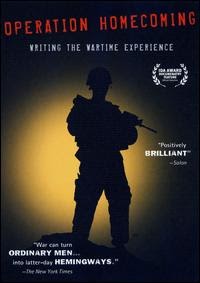I thought after reading Huze’s “Sandstorm” and O’Brien’s “The Things They Carried” that I had a pretty good idea of what soldiers endured while at war. I could not have been more wrong. After watching the PBS documentary Operation Homecoming: Writing the Wartime Experience I can honestly say that I have experienced a whole new aspect of what war does to a soldier. The words and context in which the servicemen and women spoke in this documentary were full of emotion, allowing me to more accurately comprehend the true meaning behind their words. Prior to watching this documentary I realize I understood only a small portion of their reality.
To paraphrase Tim O’Brien’s words, “there is a false notion that we need to heal from our experiences, but some things should not be healable, war being one of those things”. How does a person returning home from war “forget” their experiences? It is impossible. The events that they witnesses, the traumatic situations they endured will always be a part of who they are from this point forward. If you survived, there is no escaping this fact.
One way veterans try to deal with life after war is to write about their experiences. Author and Vietnam veteran, Joe Haldeman explained, “you write because you want others to know what you are going through”. Even still, a non-veteran can never accurately appreciate the true sacrifices made by a soldier. SSGT Edward Parker Gyokeres said in his interview that when he wrote letters home he filled them with jokes. Perhaps he did this so his family would not worry about him, but moreover, it was probably a survival mechanism he used to help ease the burden he felt.
One aspect that was referred to throughout both texts and this documentary was the fear these soldiers faced. They were afraid of war and afraid to die. The tone I felt was “kill or be killed”. Fear brings out the worst in a soldier and makes them do things they never imagined possible.
When the word “war” is mentioned my mind automatically starts thinking about guns, bombs, tanks, smoke, dead bodies, the smell of burning flesh and screaming women and children. I imagined soldiers tirelessly walking from one combat to the next. I was surprised to hear in this documentary that war is boring. Although there were some relentless events that transpired, most of the time soldiers were bored out of their mind. When waiting for the next command by the higher-ups, soldiers spent their time scorpion-fighting, rock throwing, rewriting songs, or doing other mindless activities. It is hard to imagine our soldiers traveled across the globe only to be “bored” once they got there.
I remember watching a movie called Taking Chance. I was happy, if that’s the right word to use, that the military takes the death of a soldier so sacredly. Michael Shrobel describes in this PBS documentary that for every dead soldier, his or her remains are escorted back home by a military volunteer. He personally escorted Chance Phelps’s body back home to Wyoming. Throughout the entire trip he thought about the ultimate sacrifice that Chance Phelps had made and how he owed it to him to make sure he made it home and that no detail was forgotten. Once Chance had arrived back home, it was his Chance’s family that thanked Shrobel for his service to this country.
My reaction to the ideas presented in this video is that war can be a living hell. As noted in this video, “only the dead have seen the end of the war”. (Plato) Hopefully, through writing or other therapeutic outlets one can cope with their experiences and not live a life afraid of their memories. These soldiers have been given a voice to help the rest of us understand the cruelty of war and the feelings associated with it.
Works Cited
Robbins, Richard E. Operation Homecomeing: Writing the Wartime Experience. The Documentary Group (2007)


